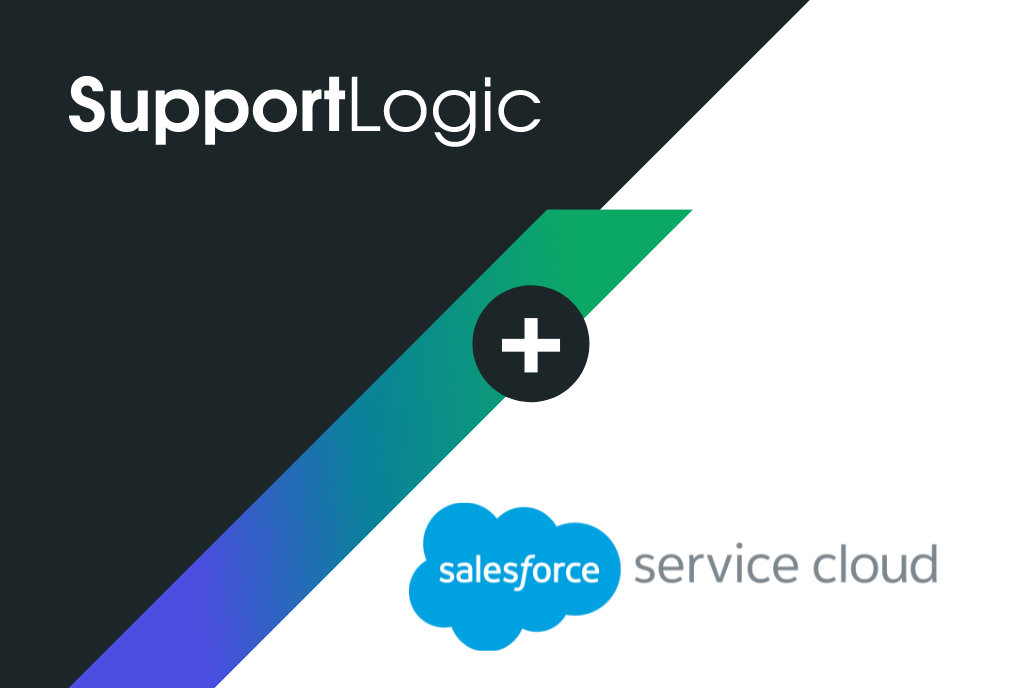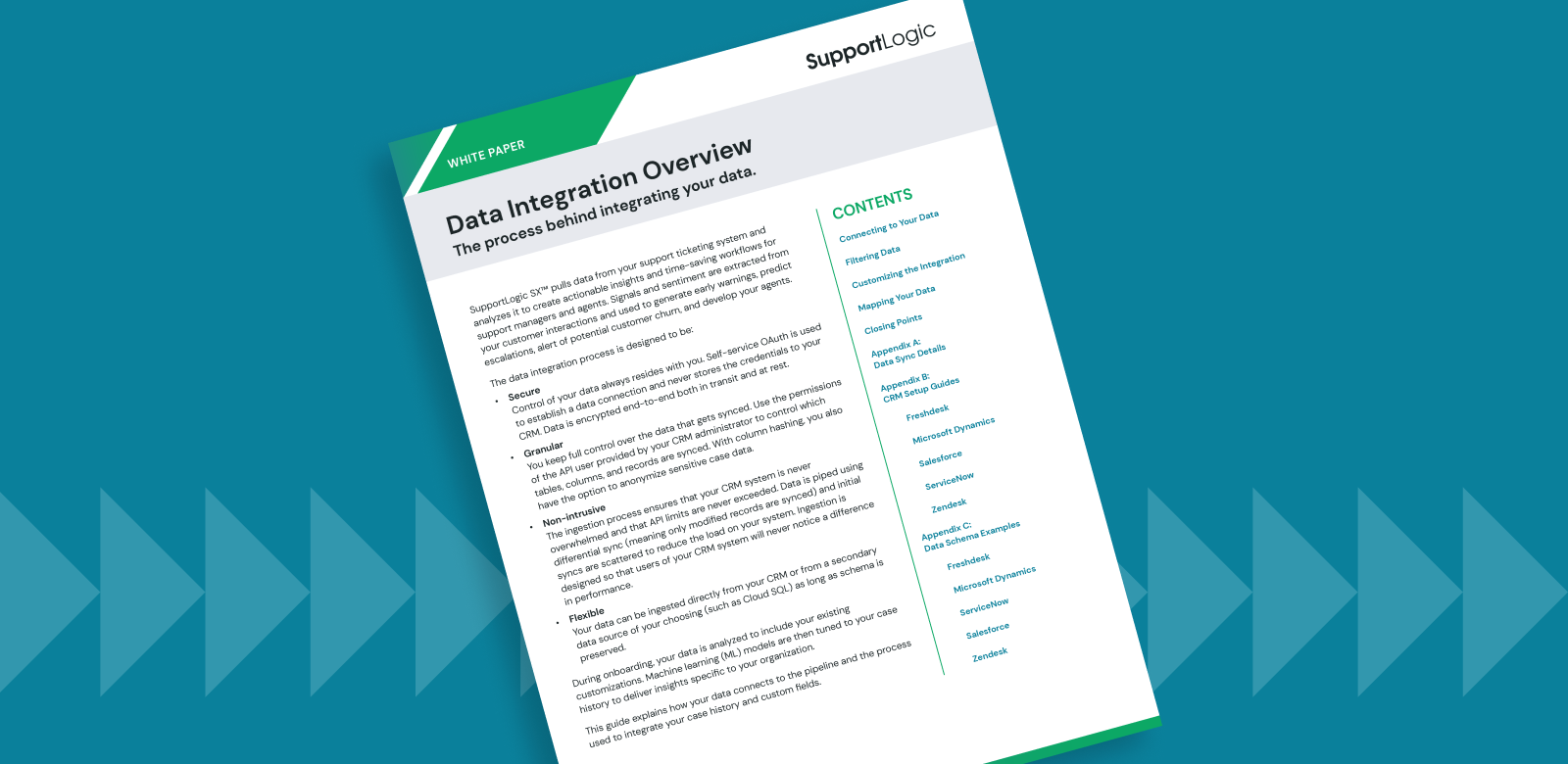
Feb 13, 2023
The 6 Best Salesforce Integrations for Customer Support
IntegrationsSupport Ticketing Systempredict escalationsSalesforce
It’s not news that delivering an excellent customer experience is the key to a brand’s success, but the margin for error is smaller than ever. A 2022 survey found that 86% of consumers will leave a brand after just two to three bad customer service experiences — even if they were previously loyal customers.
The support experience has become essential for building strong customer relationships that lead to repeat business. One of the most widely used tools for creating these tailored experiences is Salesforce, a customer relationship management (CRM) system with tools for marketing, sales, support, developer, and IT teams.
Whether you want to bridge the gap between customer support and sales teams or troubleshoot technical issues faster, you can easily integrate Salesforce directly with the software you already use. Here are six apps that offer Salesforce integrations to streamline your customer support workflows and take your team to the next level.
1. Coveo: AI-powered Relevance at Scale
The fervor surrounding OpenAI and ChatGPT prove that personalized, generative AI is now mainstream. Customers expect a personalized experience that cuts through noise and serves them the exact timely and relevant information they’re looking for – and this holds true inside Salesforce. To provide your customers with personalized experiences, the integrity of your data delivery is vital. For customer support, that must include driving Knowledge-Centered Service (KCS) and self-service support by connecting customers with the right KB articles and self-service solutions in a personalized way.
Coveo for Salesforce integrates AI-powered search and recommendations into Salesforce Service, Sales, Community, and B2B Commerce Cloud to surface relevant unified content from Salesforce and other applications. This Salesforce integration solution for customer support is so robust that Salesforce uses it to power their own enterprise search functions. Coveo also helps agents quickly find the information they need within Service Cloud and better understand the customer journey – shortening time to resolution and boosting agent proficiency.
2. GetFeedback: Collect customer feedback in real time
Feedback is crucial to improving the support experience, and you’re in luck — your customers want to tell you how they feel. In fact, 85% of consumers surveyed said they’re likely to share feedback after a good experience with a brand, and 81% will provide feedback after having a bad experience. Without access to customer feedback, support teams won’t be able to deliver a support experience that meets customer expectations, leaving people even more dissatisfied.
GetFeedback is one of the Salesforce integrations that collates real-time feedback across all channels — including email, SMS, websites, and mobile apps — to give support agents a 360-degree view of the customer experience. GetFeedback offers pre-built surveys for customer satisfaction score (CSAT), Customer Effort Score (CES), and Net Promoter Score (NPS). After adding their Salesforce integration, you can create custom feedback surveys based on the latest customer data pulled directly from your CRM platform.
GetFeedback automatically sends survey requests immediately after agents close cases. Survey data is then mapped to Contacts, Accounts, and Cases in Salesforce so agents can personalize the support experience for each individual. Managers can also set up automated alerts that immediately notify them when a customer reports a negative experience so they can act quickly to resolve the issue.
3. SupportLogic: Deliver proactive customer support at scale
Many support teams find themselves stuck in reaction mode, putting out fires rather than predicting issues before customers become frustrated. The result: managers and agents get burnt out, and customer relationships suffer.
SupportLogic SX uses AI and natural language processing (NLP) technology to analyze every customer interaction and predict the cases that might escalate so you can take immediate action. Customer sentiment and attention scores help managers route cases to the best available agents, reduce backlogs, and speed up resolution times. All of this is geared toward helping your support team do more with less – injecting efficiency into Salesforce Service Cloud.
Bi-directional data integration with Salesforce brings your workflow to one place so you can manage support cases and customer records directly within SupportLogic while keeping all records in Salesforce. By using over 40 signals to track customer sentiment, SupportLogic SX is proven to reduce case time by prioritizing the cases that need the most attention. The Salesforce integration also enables support agents to swarm and collaborate with other departments to address the most complex customer issues, with no need for additional CRM licenses.
4. Jira: Speed up troubleshooting and issue resolution
Support agents often collaborate with other departments, like engineering and product teams, to get help with resolving complex cases. But if these teams can’t connect to unified customer data, this could lead to inefficient, back-and-forth communication that extends resolution times and frustrates customers even further.
If your engineering team uses Jira for project management, then you can connect it with Salesforce to provide both support agents and engineers with complete visibility of recent customer activity, sales, and case status changes. This integration allows agents to create Jira issues within the Salesforce app and comment on active cases, enabling seamless collaboration between support and engineering teams. With access to Salesforce data, engineers can respond more quickly to new user requests, fix bugs, or troubleshoot more technical issues.
Bi-directional synchronization automatically pushes and pulls information for each case so support agents can quickly escalate complex customer issues to other teams for faster and more efficient issue resolution. Plus, the sync functionality keeps customers updated on the progress of their cases.
5. Zendesk: Connect customer support and sales teams
Imagine a support agent just closed a long, frustrating case with a customer, only for a sales rep to try to sell the same customer on a subscription upgrade. The customer would be confused at best, or at worst, completely put off and starting to consider whether they want to continue their subscription at all.
Sales reps work hard to nurture new leads, and support agents make every effort to resolve issues quickly and effectively. When sales and support teams are in sync, they can provide personalized customer experiences that improve satisfaction and drive conversion.
To bridge this gap between these teams, the widely used customer service solution Zendesk created Salesforce Connector. This pre-built integration platform feeds Salesforce CRM customer data directly into Zendesk Support. After integrating Zendesk with Salesforce, the GRC software provider Ideagen used automation to solve hundreds of tickets in minutes and improve CSAT by 20%.
With this app and Salesforce integration, customer support agents can see a complete Salesforce customer profile alongside a live ticket without ever leaving Zendesk Support. This seamless connectivity empowers agents to provide highly personalized experiences informed by a customer’s entire history with the company.
Custom workflows also improve productivity and resolution times. An example use case is an automation that assigns tickets based on the customer’s loyalty status in Salesforce to ensure the most loyal customers receive priority support.
6. Dialpad: Simplify customer communications
To deliver the seamless, personalized experience that customers crave, support agents need to have all customer data in one place. When agents have access to previous interactions with a customer, they can avoid asking for the same information over and over, which can quickly frustrate already unhappy customers.
Dialpad is a business communication platform that offers an AI-powered contact center to empower agents to provide high-quality omnichannel support. Dialpad’s AI automatically transcribes calls so support agents can focus on talking to customers.
Dialpad takes agent coaching to the next level by using AI-enabled speech analysis to identify keywords and suggest responses to customers in real time. Additionally, managers can use tools like listen-in, barge-in, and takeover to intervene in cases as they see fit.
Dialpad’s Salesforce integration automatically logs calls, messages, recordings, transcripts, and notes in Salesforce so agents don’t have to switch between apps. Support agents can see Salesforce data from right inside the Dialpad user interface or make outbound calls and receive inbound calls from within Salesforce, depending on your preferred workflow.
Elevate the best Salesforce integrations with AI
With a whole suite of Salesforce integrations available, you are sure to find the right combination of tools to eliminate data silos, boost agent productivity, and streamline your support operations. Now that you’ve got a headstart on the best Salesforce integrations, consider pairing them with an AI-powered support experience platform like SupportLogic SX. SupportLogic automatically extracts over 140 customer sentiment signals to help you manage escalations and gain deeper insight into the customer experience.
To learn more about how to deliver proactive customer support, check out our guide on plugging SupportLogic into Salesforce.
Don’t miss out
Want the latest B2B Support, AI and ML blogs delivered straight to your inbox?



